| کد مقاله | کد نشریه | سال انتشار | مقاله انگلیسی | نسخه تمام متن |
|---|---|---|---|---|
| 5816061 | 1115552 | 2009 | 9 صفحه PDF | دانلود رایگان |
عنوان انگلیسی مقاله ISI
The preferential dopamine D3 receptor antagonist S33138 inhibits cocaine reward and cocaine-triggered relapse to drug-seeking behavior in rats
دانلود مقاله + سفارش ترجمه
دانلود مقاله ISI انگلیسی
رایگان برای ایرانیان
کلمات کلیدی
موضوعات مرتبط
علوم زیستی و بیوفناوری
علم عصب شناسی
علوم اعصاب رفتاری
پیش نمایش صفحه اول مقاله

چکیده انگلیسی
We have previously reported that selective dopamine (DA) D3 receptor antagonists are effective in a number of animal models of drug addiction, but not in intravenous drug self-administration, suggesting a limited ability to modify drug reward. In the present study, we evaluated the actions of S33138, a novel partially selective D3 receptor antagonist, in animal models relevant to drug addiction. S33138, at doses of 0.156 or 0.625Â mg/kg (i.p.), attenuated cocaine-enhanced brain-stimulation reward (BSR), and the highest dose tested (2.5Â mg/kg) produced a significant aversive-like rightward shift in BSR rate-frequency reward functions. Further, S33138 produced biphasic effects on cocaine self-administration, i.e., a moderate dose (2.5Â mg/kg, p.o.) increased, while a higher dose (5Â mg/kg, p.o.) inhibited, cocaine self-administration. The increase in cocaine self-administration likely reflects a compensatory response to a partial reduction in drug reward after S33138. In addition, S33138 (0.156-2.5Â mg/kg, p.o.) also dose-dependently inhibited cocaine-induced reinstatement of drug-seeking behavior. The reduction in cocaine-enhanced BSR and cocaine-triggered reinstatement produced by lower effective doses (e.g., 0.156 or 0.625Â mg/kg) of S33138 is unlikely due to impaired locomotion, as lower effective doses of S33138 decreased neither Ymax levels in the BSR paradigm, rotarod performance, nor locomotion. However, the higher doses (2.5 or 5Â mg/kg) of S33138 also significantly inhibited sucrose self-administration and rotarod performance, suggesting non-D3 receptor-mediated effects on non-drug reward and locomotion. These data suggest that lower doses of S33138 interacting essentially with D3 receptors have pharmacotherapeutic potential in treatment of cocaine addiction, while higher doses occupying D2 receptors may influence locomotion and non-drug reward.
ناشر
Database: Elsevier - ScienceDirect (ساینس دایرکت)
Journal: Neuropharmacology - Volume 56, Issue 4, March 2009, Pages 752-760
Journal: Neuropharmacology - Volume 56, Issue 4, March 2009, Pages 752-760
نویسندگان
Xiao-Qing Peng, Charles R. Jr., Krista Spiller, Xia Li, Jie Li, Nitza Thomasson, Mark J. Millan, Elisabeth Mocaër, Carmen MuÅoz, Eliot L. Gardner, Zheng-Xiong Xi,